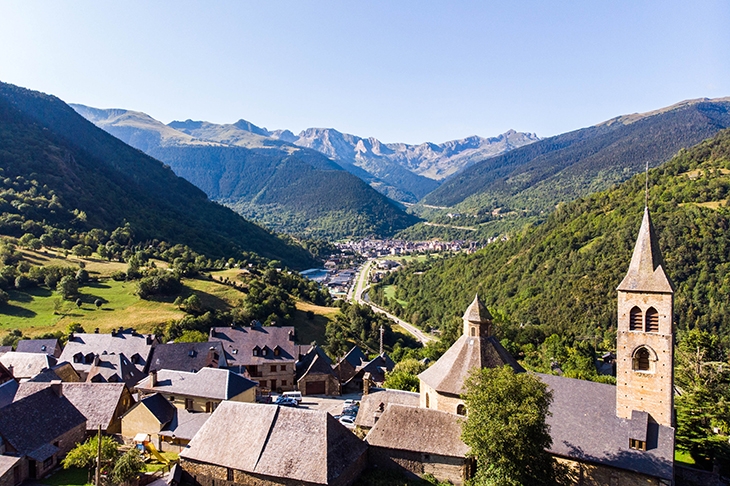On 26 August 1880 Henry Russell consummated his marriage in an unusual way. He was, to his own mind, married to the Vignemale, the highest French peak in the Pyrenees, and, wishing to spend the night with his beloved, he climbed to the 10,820ft summit and got his servants to dig a trench, bury him under earth and stones, wrapped in his sheepskin sleeping-bag, and leave him to the darkness. He survived and wrote of this night: ‘It seemed as though I had left the earth.’
Russell is one of the oddballs with whom Matthew Carr’s book teems. Another is Sabine Baring-Gould, the author of ‘Onward, Christian soldiers’, who in 1848 visited the Algerian emir Abd-el-Kader, imprisoned by the French in the château at Pau. He was not as impressed by this Sufi hero as most others were. The emir and his wives ‘lounged about the rooms, silent and smoking, sulky, without occupation and without interests’, Baring-Gould wrote. ‘Their habits were so dirty that the tapestries and rich furniture had all to be removed.’ The writer was only 14 when they met, though Carr does not mention this. He is such a collector of Pyrenean connections that we often want to hear more of the people he introduces.
Nothing by way of history or imagination is alien to his account of this 270-mile chain of mountains. We follow Henry Swinburne on a hot day in 1776 to the 9,439ft summit of the Pic du Midi de Bigorre, where no local person would venture. ‘Dreary’ was his verdict, but also ‘savage’.
Later we join Swinburne’s kinsman Algernon for a dip in the freezing Lake Gaube, which (recollected 37 years later, from the domesticity of The Pines, Putney) produced ‘one of the most extraordinary English-language poems of the 19th century’, in Carr’s judgment. ‘The Lake of Gaube’ is certainly very Swinburnean, with its long anapaestic lines rejoicing in the plunge of the gingery diver, who ‘swiftly and sweetly, when strength and breath fall short, and the dive is done, / Shoots up as a shaft from the dark depth shot, sped straight into sight of the sun’.
As for savagery, on the whole Carr, a journalist and writer who has devoted a book to the purging by Spain of its Muslims, likes it when it is limited to landscape. But if there’s one thing he hammers home, it is that the Pyrenees are not a wall or strategic barrier. It’s rather like Trollope nagging away at whether Mr Crawley stole the cheque. Eventually the reader would be happy for it to be settled either way so long as the matter is dropped. It is true that languages (Basque, Catalan, Gascon) straddle the range, that scholars, pilgrims, refugees and armies have crossed it. But mountain passes (Roncesvalles, Somport, La Jonquera) are few, and separate cultures such as that of the Val d’Aran developed in isolation until 20th-century tunnels bored into their lost world. Even Carr says that ‘for centuries the Pyrenees constituted the physical dividing line between European Christendom and Islamic Iberia’, though he can’t really think that it was for centuries. Within decades of the Umayyad invasion of Spain in 711, Christian rulers were already expanding their territories in Asturias and Navarre.
Anyway, when pilgrims to Santiago came by way of the pass of Roncesvalles (Roncevaux), they were conscious that here Charlemagne’s rearguard under Roland fell in battle with the Saracens. Carr points out soberly that the Franks were probably killed by Basques, which rather undermines the Christian–Moorish culture clash. He is uncomfortable, though, with The Song of Roland’s way of depicting the blackness of many Saracens as ‘some kind of explanation for their savagery and depravity’. It is, incidentally, a little misleading of him to say that the poem was ‘discovered in an Oxford library in 1837’. In 1835 a French philologist visited the Bodleian and copied out the oldest extant manuscript of the Chanson, which was printed in France in 1837 to patriotic acclaim. But as Carr must be aware, the story was known to Dante, Chaucer, Cervantes and every high poet of the Middle Ages and Renaissance. Before it was given to the Bodleian in 1634 by that strange man Sir Kenelm Digby, the 12th-century manuscript had belonged to Oseney Abbey (the remains of which can be seen on the left just before the train from London reaches Oxford station).
Carr doesn’t always quite say what he means, as when he writes of a Romanesque carving (over the chapel door at Assouste) of ‘two angels carrying the Greek letters for the first two letters of Jesus’s name’. He means the chi-rho, from the name Christ. Same person, different name.
Someone has helpfully gone through the book giving the metric equivalent of every mile and foot, so that we find ‘less than a mile (1.6 kilometres)’. It reminded me of the assiduous postwar subeditor at the Daily Telegraph who amended a quotation to read: ‘She was looking like a million dollars (£368,333).’ Yet there are so many inviting leads to be followed up in this book that no one who loves the Pyrenees or plans to explore them should be without it.






Comments